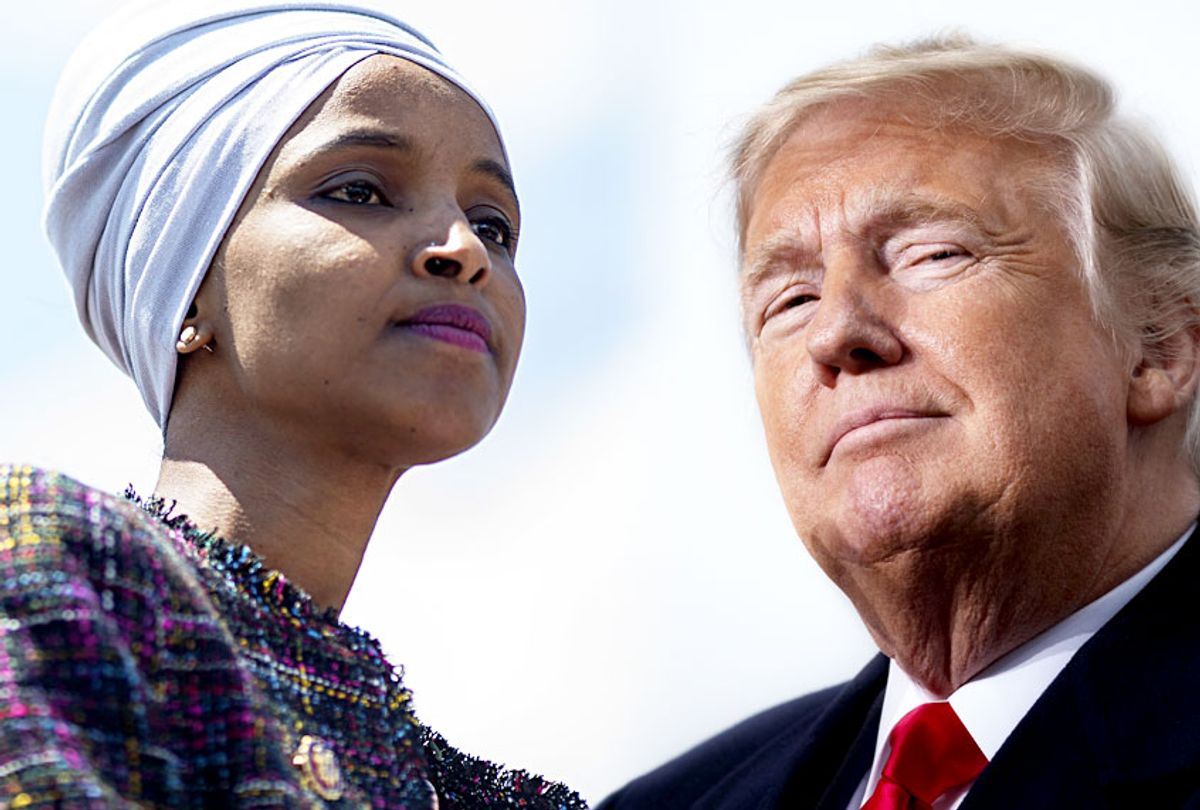Rep. Greg Steube, a far-right Florida Republican and staunch supporter of President Donald Trump, was obviously thinking of Rep. Ilhan Omar of Minnesota earlier this month when he introduced a bill designed to regulate campaign spending. But journalist Lachlan Markay, in the Daily Beast, reports that there could be an unintended consequence of the bill: it could "inadvertently ban the president's reelection campaign from spending money at Trump-owned businesses."
When Steube introduced the Obstructing Monetary Allocations to Relatives Act, Markay explains, it was a "not-at-all-subtle shot at Omar, who has steered nearly $600,000 since 2018 to a company owned by political consultant Timothy Mynett — whose ex-wife said in divorce filings in early 2019 that he had admitted to carrying on an affair with Omar." Mynett and the progressive Minnesota congresswoman were married in March, but months before that, the National Legal and Policy Center (a right-wing nonprofit) filed a complaint with the Federal Election Commission and alleged that payments to Mynett's firm were a violation of prohibitions against the personal use of campaign funds.
Steube's bill, abbreviated as the OMAR Act, forbids campaign payments "to a vendor which is owned or controlled by an immediate family member of the candidate" — and specific examples include "a father, mother, son, daughter, brother, sister, husband, wife, father-in-law or mother-in-law." And a company, under the OMAR Act, is controlled by the family member of a candidate if that family member "is a member of the board of directors or similar governing body of the vendor."
Markay says of the OMAR, Act, "It's almost certain that Rep. Greg Steube (R-FL) did not intend to prohibit the president from steering campaign funds to his own hotels, resorts and golf clubs."
According to Markay, Steube spokesperson Carson Steelman "repeatedly defended Trump campaign spending at businesses owned by the president" in e-mails to the Beast.
"Nonetheless, Steube's bill runs into real-world problems when it comes to the president's actual business and political entanglements," Markay explains. "Upon taking office in 2017, Trump publicly insisted he had turned over all operations to his two adult sons: Eric Trump and Donald Trump Jr., who remain the top two executives at (his) privately held company. That means the Trump Organization is, under the terms of Steube's bill, 'controlled' by immediate family members of the candidate — and therefore, that the Trump campaign would be prohibited from spending money at Trump properties."
Markay notes that a similar bill has been introduced by a Democrat: Rep. Raul Ruiz of California. But there is a key difference between what Steube is proposing and what Ruiz is proposing.
"Steube decided to narrow the range of family members covered by his legislation," Markay observes. "Ruiz's version of the bill extends its extends the prohibition to vendors owned or run by the candidate himself or herself."
He explains:
For that reason, in emails with The Daily Beast, Steelman repeatedly defended Trump campaign spending at businesses owned by the president, who has steered millions in campaign funds to his own properties since 2015. Steelman also refused to acknowledge whether the bill would, in fact, prohibit that spending.
Nonetheless, Steube's bill runs into real world problems when it comes to the president's actual business and political entanglements. Upon taking office in 2017, Trump publicly insisted he had turned over all operations to his two adult sons, Eric Trump and Donald Trump Jr., who remain the top two executives at the privately held company. That means the Trump Organization is, under the terms of Steube's bill, "controlled" by immediate family members of the candidate, and therefore that the Trump campaign would be prohibited from spending money at Trump properties.




Shares